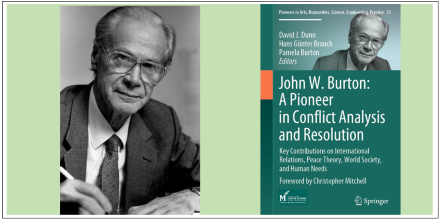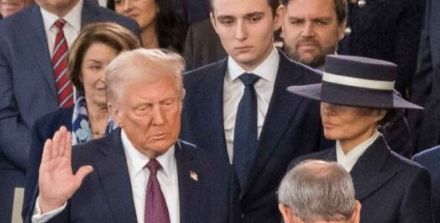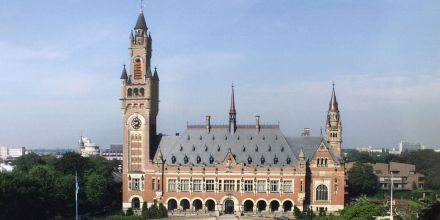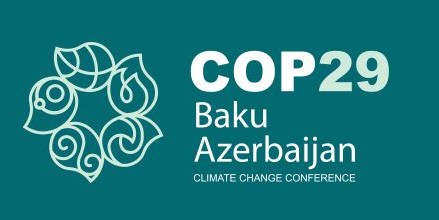John W. Burton: A Pioneer in Conflict Analysis and Resolution
Feb 2025 - News
A new book published by Springer charts John W. Burton's transition from practitioner in diplomacy to pioneer in the theory of peace research, thinking on world society and conflict resolution. The book includes an important chapter by Toda Peace Institute Director, Kevin P. Clements. This book is published as part of Springer's Pioneers in Arts, Humanities, Science, Engineering, Practice series.
Deep freeze: Trump leaves US diplomats with little to offer Pacific
Feb 2025 - News
The slew of executive orders signed within hours of Trump re-entering the White House and others since have caused consternation for Pacific leaders and communities and alarm for those operating in the region. Read more in this opinion column by Tess Newton Cain, Principal Consultant at Sustineo P/L and adjunct Associate Professor at the Griffith Asia Institute. This article published by RNZ News. Image: wikicommons
Climate crisis erodes Cook Islands’ cultural identity, women's council head tells ICJ
Dec 2024 - News
Cook Islands has highlighted the impact of climate change on cultural heritage, particularly for women, during its historic participation at the International Court of Justice (ICJ) hearings in a landmark climate change case. However, the Court was told that women's knowledge, spirit and community soul offer urgency, hope and resilience in the face of climate change. "This is why the court must advise that the world respect our human rights as indigenous Cook Islands women in this climate crisis," said Vaine Wichman, president of the Cook Islands National Council of Women Find the full story on RNZ Pacific news here. Also, Oral submissions wrap in climate court case; opinion expected 2025 RNZ Pacific news. Image: ChameleonsEye/shutterstock.com
ICJ to begin hearings in landmark climate change case started by Pacific Islander students
Dec 2024 - News
The International Court of Justice is set to begin two weeks of hearings on Monday in a landmark case on the obligations of states to protect the climate from greenhouse gases. The idea for the case came from a group of students studying law at a university in Vanuatu. Experts say the court's findings could bolster the cases of nations taking legal action against big polluters failing to reduce emissions. Find the full story on RNZ news here. Image: Wikicommons
Latest news from COP29
Nov 2024 - News
Here you will find links to a selection of the latest stories coming out of COP29, mostly those that relate to the Pacific region. These stories can be found in full by following the links to The Conversation, RNZ International/Pacific and ABC. The most recent stories are listed at the top. COP29 deal disappoints Kiwi climate activists The world's least-developed nations have reacted angrily to the deal reached at the COP 29 climate summit - and New Zealand campaigners say they have a point. Pacific climate advocates decry COP29 outcome 'a failure on every front' The United Nations climate change summit COP29 has "once again ignored" the Pacific Islands, a group of regional climate advocacy organisations say. Fijian sugar minister says delegates attending UN climate summit 'wasting time' Charan Jeet Singh, Fiji's sugar minister and a millionaire businessman, has described delegates attending the United Nations climate summit COP29 in Baku, Azerbaijan, as a "financial burden to their respective countries". Australia commits $50 million towards climate recovery Australia's government has committed an extra fifty million dollars towards a global fund to deal with the loss and damage caused by the climate crisis Pacific Island nations need ‘substantial finance’ to combat climate change - Baron Waqa Speaking at the United Nations climate summit COP29 in Azerbaijan on Thursday, PIF secretary-general Baron Waqa said climate change poses the single greatest existential threat to the survival of Pacific Islands. The Moana effect: how small island developing states are bringing their struggle against climate change to the world The animated movie Moana parallels the fight happening in the real world as small island developing states and youth activists push for climate action COP29: ‘climate finance’ for the Pacific is mostly loans, saddling small island nations with more debt Pacific scholars are calling on world leaders to improve the dispersal system of climate finance to support people living in small island nations Climate discussions near conclusion at COP29 As the UN climate conference enters its final three days, there's uncertainty as to whether developed nations will agree to a proposed trillion dollar climate financing agreement demanded by many developing states. COP29: Pacific negotiators frustrated by 'slow process' of climate talks The big goal of this COP is to increase annual climate financing target from 100 billion US dollars originally set in 2009 for developed nations to help developing countries reduce emissions and adapt to climate impacts but progress is slow. COP29: Nauru unveils ‘groundbreaking’ citizenship by investment scheme for climate action Nauru has launched a "groundbreaking" citizenship by investment scheme at the United Nations climate change summit COP29 in Baku, Azerbaijan. 'Fossil fuels are a curse': Greenpeace Pacific head responds Azerbaijan's COP29 remarks The Pacific head of the environmental campaign organisation Greenpeace has described the comments by Azerbaijan's president that oil and gas are a "gift of God" as "disappointing". Pacific Islands Forum chair urges SIDS leaders to remain hopeful at COP29 Pacific Islands Forum chair and Tonga's Prime Minister Hu'akavameiliku Siaosi Sovaleni has urged leaders' from small island nations at the United Nations climate change meeting to "not be disheartened," despite the "disappointing outcomes of UNFCCC Conferences in the past". COP29: who pays for climate action in developing nations – and how much – becomes more urgent The key focus of COP29 is on establishing a new collective goal for climate finance to help developing countries to reduce emissions and adapt to climate impacts. COP29: UN chief warns world is in 'final countdown' to limit global warming to 1.5C UN Secretary-General António Guterres told world leaders at COP29 that 2024 has been a "masterclass in climate destruction", recording the hottest day and month, and is tracking to also include the hottest year. COP29: Tuvalu calls for fairer climate finance system for small island states Tuvalu's Prime Minister Feleti Teo has added his voice to the calls for a more just climate finance system for small island states and the least developed countries. Authoritarian fossil fuel states keep hosting climate conferences – how do these regimes operate and what do they want? It’s concerning that a succession of authoritarian and fossil fuel-rich states have been selected to host international climate negotiations. It means we must pay extra attention to political influences on the talks and beware of greenwashing by the hosts. Trump win, 1.5 C warming breach weigh on UN COP climate finance talks Pacific delegates fear the implications of a Trump presidency and breach of the 1.5 degree Celsius warming target will overshadow negotiations on climate finance Climate Financing expected to be main agenda of Pacific Islands at COP29 Discussions are set to centre heavily on climate financing, something Pacific countries will be looking to see concrete commitments to. COP29 as a ‘finance COP’ must deliver if we are to heal ‘sick earth’ - Tonga PM Pacific communities are the least responsible for climate change. The countries responsible for this crisis must front up and take responsibility. COP29: A life of living in fear Vanuatu’s ‘new normal’ As the world gears up for COP29 in Azerbaijan, the government and the people of Vanuatu continue to amplify the call for "1.5 to stay alive", to ensure our efforts for survival are not in vain. COP29: Pacific countries cannot be conveniently pigeon-holed Pacific Small Island Developing States (PSIDS) are the uncomfortable reminder for those who want smooth sailing of their agenda at COP29, that while we are able to hold the tension of our vulnerability and resilience in the Pacific, this may make for choppy seas. Image: urbanbuzz/shutterstock.com




